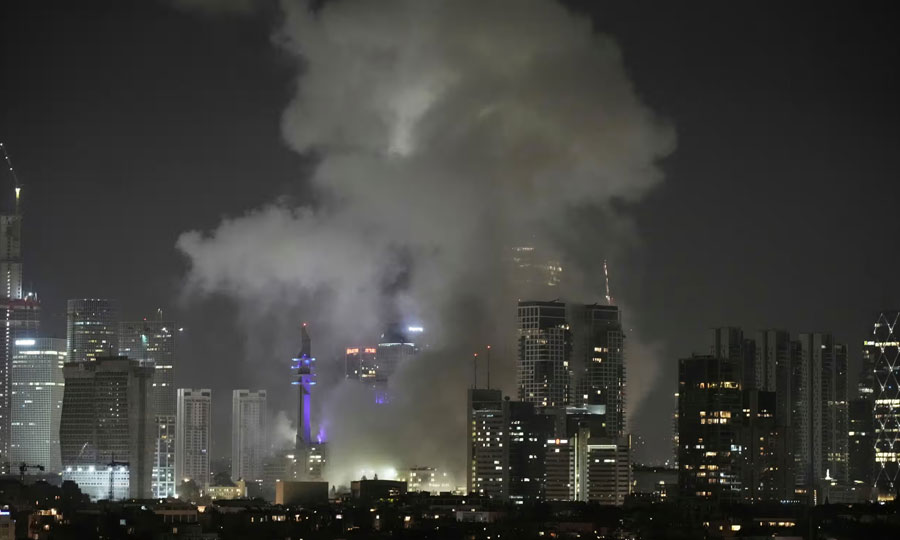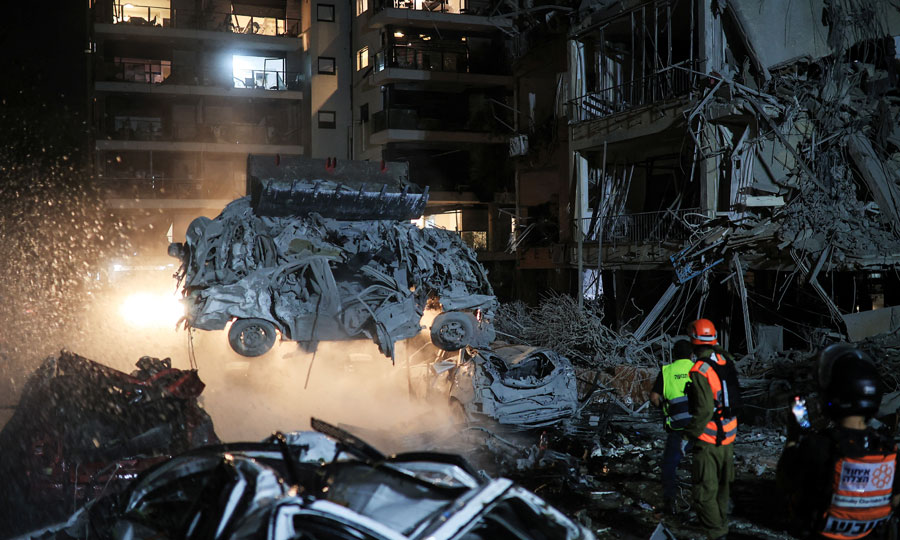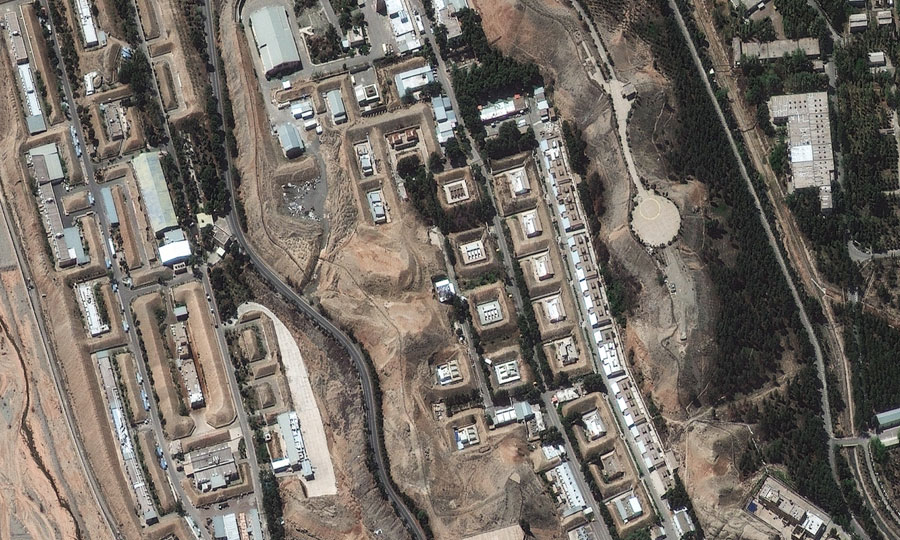
Kathimerini Greece Newsroom
by Lucas Velidakis
Israel launched the largest military operation in its history against Iran on Friday, carrying out a surprise, large-scale assault targeting Iran’s nuclear, military and scientific infrastructure. Strikes were reported in Tehran, Isfahan and especially Natanz, a key uranium enrichment facility.
Mossad reportedly spent eight months planning the operation, which combined aerial strikes with sabotage on the ground.
Throughout the day, Israeli forces carried out attacks across various parts of Iran. In response, Iran launched a wave of missile strikes later that evening.
According to the semi-official Tasnim news agency, at least four senior members of Iran’s Revolutionary Guard Corps, including commander Maj. Gen. Hossein Salami, were killed in the Israeli strikes, along with two nuclear scientists.
Iranian media reported at least 70 people killed and 320 others injured.
By late afternoon, Iranian outlets reported new explosions in Tehran’s western province, including the cities of Shahr-e Qods and Malard, as well as the Chitgar district of the capital. A strike was also reported in Pakdasht, southeast of Tehran.
Late Friday night, Israel said it had destroyed critical nuclear infrastructure in Isfahan as part of its ongoing military campaign.
According to a statement by the Israel Defense Forces, fighter jets targeted facilities linked to the reprocessing of enriched uranium, a step considered essential in the development of nuclear weapons.
The strikes targeted a uranium metal production unit, enrichment conversion infrastructure, laboratories and other critical sites.
Israeli Ambassador to the United States Michael Leiter said the next strategic target would be the underground nuclear complex in Fordow.
Iran responds with missile barrage
Iran responded swiftly, announcing the launch of “Operation Harsh Punishment” and denouncing the Israeli attacks as acts of terrorism.
Explosions were heard in the Israeli capital, and air raid sirens sounded nationwide as Iran launched hundreds of ballistic missiles and drones in retaliation for the earlier Israeli strikes that killed top Iranian military and nuclear officials.
Dozens of missiles were seen over Jerusalem. Israel’s Iron Dome air defense system was activated to intercept the incoming fire.
Explosions were also reported in Tel Aviv, with thick smoke seen rising over the city. There were reports of civilian injuries. The Israeli military said some of the attacks were intercepted before reaching their targets.
The escalation caused casualties in other regions as well. Palestinian media reported that three children were injured by missile fragments near Hebron.
The Israeli military said the rocket that hit the area originated from Yemen.
In a televised address, Israeli Prime Minister Benjamin Netanyahu said the operation aimed to disable Iran’s nuclear infrastructure, ballistic missile production facilities and military leadership.
Netanyahu spoke by phone with former U.S. President Donald Trump. An official speaking on condition of anonymity said Trump “reaffirmed U.S. support for Israel” and urged Iran’s leadership to “choose de-escalation and diplomacy before it’s too late.”
The Israeli prime minister also held a series of calls with world leaders throughout the day.
In Tehran, Supreme Leader Ayatollah Ali Khamenei vowed a “harsh, unrelenting response,” calling the Israeli strikes acts of terrorism and declaring, “We will show strength, and we will show no mercy.”
U.N. Secretary-General António Guterres urged all sides to exercise “maximum restraint.”
The international community reacted with alarm, and analysts warned the conflict could have unpredictable consequences for both regional and global security.
Trump: We knew everything
Former U.S. President Donald Trump said his administration had full knowledge of Israel’s plan to strike Iran. In an interview with Reuters, Trump said, “I knew everything” and claimed he had tried to prevent the escalation.
“I tried very hard to save them from humiliation and death. I would have liked there to be a deal,” he said. “It’s still not too late.”
Trump said he had given Iran a 60-day deadline to reach an agreement, and that “today is day 61.”
He said Washington had asked Tehran to end its uranium enrichment program, but Iran refused. “We knew enough to give Iran 60 days. Now it’s the 61st, right? So we knew everything,” he said.
Asked whether Iran still maintains a nuclear program, Trump replied, “Nobody knows. It was a very destructive strike.”
The U.S. State Department issued an emergency warning advising American citizens not to travel to Iran under any circumstances and urged those already there to leave immediately.
Macron: Iran bears heavy responsibility
French President Emmanuel Macron said Iran bears “heavy responsibility” for destabilizing the Middle East, arguing that Tehran unjustifiably advanced its nuclear program despite diplomatic offers from the United States.
At a press conference in Paris, Macron said France was not involved in the planning or execution of the Israeli attacks and remains committed to diplomacy. He said French intelligence on the progress of Iran’s nuclear program was “particularly concerning,” but that Paris did not advocate for military action.
“We cannot live in a world where Iran possesses nuclear weapons,” he said. “Despite recent events, we must not forget Gaza.”
“Our goal is an immediate return to negotiations,” he said. He also urged all parties to show restraint and expressed regret that Iran had not responded to U.S. diplomatic efforts.
Macron reiterated France’s support for the creation of a demilitarized Palestinian state that recognizes Israel. He said he remains committed to recognizing Palestinian statehood. The upcoming U.N. summit in New York has been postponed due to the crisis.
Putin sends dual message to Iran, Israel
Russian President Vladimir Putin held separate phone calls with Iranian President Masoud Pezeshkian and Israeli Prime Minister Benjamin Netanyahu, according to the Kremlin.
In his conversation with Pezeshkian, Putin expressed condolences for those killed in the Israeli strikes and condemned the attack as a violation of the U.N. Charter.
In a separate call with Netanyahu, Putin said Iran’s nuclear program should be addressed through diplomatic channels and warned against further escalation in the region.































